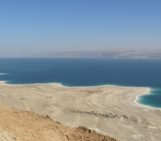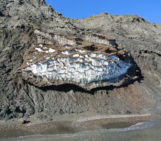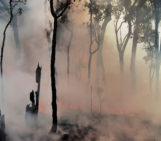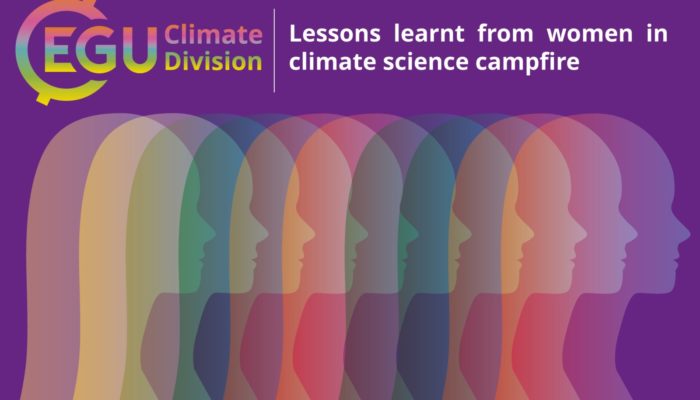
‘Women in Climate Science Campfire’ event
On November 7th, 2022, the EGU Climate Division outreach team hosted a campfire event, a series of online presentations on ‘women in climate science,’ where we covered subjects from the current state of knowledge on women being affected by climate change to many of the challenges female scientists faced (or faces) in the current societal landscape. Following the presentations given by three invited speakers, we had a lively discussion in an intimate setting; a casual chat where it almost felt like we were sitting around a campfire. We invited three speakers: 1) Professor Paola A. Arias from University of Antioquia, 2) Dr. Franziska Lechleitner from University of Bern (Swiss National Science Foundation (SNSF) Ambizione group leader), and 3) Dr. Carole Nehme from University of Rouen Normandy (Lecturer). In this blog post, we summarised the main takeaway from the event to provide insights for upcoming and future female climate scientists.
Campfire attendance: Issues with gender and diversity balance
There were total of 32 participants in the campfire event, and with mostly female attendance. There were higher density of people coming from central Europe, as the campfire was hosted by EGU, but we had some participants from North America and Asia. One of the interesting takeaways from the survey was that most of the attendees were women in science. On one hand, it is understandable as campfire event provides a safe space for women to casually discuss many of the issues surrounding these issues. On the other hand, as many universities are actively working towards recruiting diverse candidates in graduate school, it is interesting to see such few attendances from other genders. Furthermore, as EGU campfires are usually only open to EGU members, it would be nice to open up these events to the public to provide opportunity for K-12 students and early career scientists to attend these events.
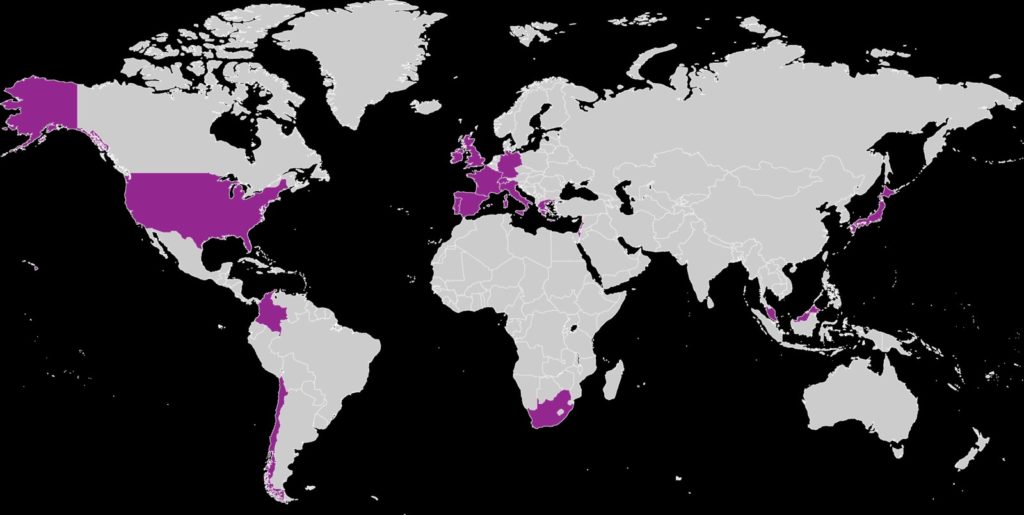
Figure 2. There were 32 participants in the EGU CL Division women in science campfire event. The map, coloured in purple, indicates the location of all the participants in this event.
Climate change and its effect on gender equality and diversity
Professor Paola A. Arias gave a captivating talk at the women in science campfire event, mainly focusing on the effects of climate change on gender equality and diversity. The importance of gender perspective and diversity and the effect of existing inequality due to anthropogenic climate change has already been highlighted in Chapter 18 of the intergovernmental panel on climate change (IPCC) six assessment report1 in line with sustainable development goal (SDG) 5 [1]. The recent UN progress report2on the SDG goals suggests it may take another few hundred years (~ 285) to reach the gender balance [2]. Based on the daily recordings between 1970 to 2019, one disaster leads to on average 115 deaths of women [2]. The main factors causing this inequality could be poverty, women’s lack of access to knowledge and education and significantly less influence in related decision-making at the community level. This is especially the case in low-income countries or in regions with a conservative culture, which in practice, favours men over women. For instance, in Somalia, the migration of families from rural to urban areas due to flooding, droughts and conflicts has decreased girls’ enrolment rates by 16 % to just 29 %, while boys’ enrolment has risen to 41%, with a 12 % increase [2].
Professor Arias also discussed the lack of female representation in climate science as well as in many governmental bodies. For example, the IPCC only increased in female representation by ~20% since the ‘90s. Additionally, this gender disparities exists within different working groups in 2021 IPCC report where working group II studying social aspects had more female participants (40% women) than in working group I, investigating scientific aspects of climate change (27% women).
It’s been pointed out there are different reasons that diminishes the female influence in the climate science. For example, the lack of gender diversity in the number of authors leading the top 100 climate papers globally, is arguably due to the hidden bias towards the credibility of the articles lead-authored or written only by women. Other factors, such as the possibility of historic discrimination in the climate community, could also be one of the reasons for the lower scientific influence of women who come from specific regions. For example, among the 1000 climate academics in the Reuters list of the world’s top climate scientists in 2021, only 111 scientists were from the Global South.
Reality of being a woman in climate science
Following Professor Arias’s talk, Dr. Franziska Lechleitner and Dr. Carole Nehme discussed the nature of being a woman in climate science. Despite coming from different backgrounds, both scientists discussed working as a woman in science comes with personal challenges. To name a few is to pursue a career in countries that climate change is less paid attention to and culturally is controversial for women to get involved in outdoor activities and field work with men or alternatively to follow the passion for science in other countries and then having to work in the second or even the third language. Additionally, working as a female scientist often comes with more challenging as a parent (or planning to be a parent). This is even the case in countries with access to more resources, which are expected to better support women at their workplace. High cost of childcare and not having proper facilities at their respective universities for working mothers, especially with new born babies, push women to choose between two extremes: 1) Pursuing their career ambitions at the cost of having less quality time with their families or 2) slowing down and letting go of some of their career goals that they initially hoped to achieve. At the campfire event, it was highlighted that there were personal sacrifices being made, e.g., missing out of some scientific activities to spending less time with people you like, which led to dealing with difficult emotions as well as facing some mental health issues.
Take away from the campfire event
Regardless of the challenges mentioned above, women still could keep a good work-life balance by identifying the most important thing to prioritise in their life and knowing why they are choosing a particular responsibility or a career path. Working with people they enjoy and having a mentor or a network of people who can support them would also help women to progress with a positive mindset. Last but not least, paying attention to any achievement and learning from the struggles and experiences of working as a woman in science could make a good example for the next generation who would like to choose the climate sciences as their field of work. This can add to one’s career contribution.
Acknowledgement
We would like to thank our speakers for the time they spent to read the draft and provide us with their valuable feedback and for providing their presentation slides. Please find them here:
EGUCampfire_Women_PaolaArias_2022
This blog was written and edited by the CL editorial board.
References [1] Schipper, E.L.F., A. Revi, B.L. Preston, E.R. Carr, S.H. Eriksen, L.R. Fernandez-Carril, B. Glavovic, N.J.M. Hilmi, D. Ley, R. Mukerji, M.S. Muylaert de Araujo, R. Perez, S.K. Rose, and P.K. Singh, 2022: Climate Resilient Development Pathways. In:Climate Change 2022: Impacts, Adaptation, and Vulnerability. Contribution of Working Group II to the Sixth Assessment Report of the Intergovernmental Panel on Climate Change [H.-O. Pörtner, D.C. Roberts, M. Tignor, E.S. Poloczanska, K. Mintenbeck, A. Alegría, M. Craig, S. Langsdorf, S. Löschke, V. Möller, A. Okem, B. Rama (eds.)]. Cambridge University Press, Cambridge, UK and New York, NY, USA, pp. 2655-2807, doi:10.1017/9781009325844.027. [2] United Nations Entity for Gender Equality and the Empowerment of Women (UN Women), Department of Economic and Social Affairs (DESA). Progress on the sustainable development goals: The gender snapshot 2022 Retrieved from https://www.unwomen.org/en/digital-library/publications/2022/09/progress-on-the-sustainable-development-goals-the-gender-snapshot-2022
- The IPCC Sixth Assessment Report is the sixth in a series of reports which assess knowledge on climate change, its causes, potential impacts and response options.↑
- The UN progress report on the SDG: The gender snapshot 2022 concerns gender equality across all 17 goals as well as the effect of the gender equality on progress across the SDGs.↑

